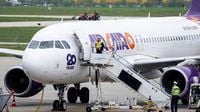In a significant humanitarian effort, Germany welcomed a group of refugees from Sudan on April 24, 2025, as the ongoing conflict between government forces and the Rapid Support Forces (RSF) has created a dire situation in the region. The refugees arrived in Hannover on a flight from Cairo, with the majority hailing from Sudan, marking a crucial step in Germany's commitment to assist those fleeing violence and instability.
According to the German Federal Ministry, the flight included particularly vulnerable individuals, among them 77 minors. Impressively, 97 percent of the new arrivals are families or single mothers with children, highlighting the urgent need for protection and support for those most affected by the conflict.
The refugees were proposed for admission through the European Union's Resettlement Program, as facilitated by the United Nations High Commissioner for Refugees (UNHCR). This program is designed to assist individuals who face specific protection needs, such as those who have experienced torture, violence, or who have medical needs that cannot be met in their current location. The UNHCR plays a critical role by recommending individuals to receiving states based on their vulnerability and need for safety.
Before these individuals were allowed to enter Germany, German authorities conducted thorough interviews, health checks, and security screenings to ensure the safety and well-being of both the refugees and the host community. This process is essential to maintain the integrity and security of the resettlement program.
Germany had previously pledged to accept a total of 13,100 refugees as part of its commitment to the UNHCR and the EU Commission for the years 2024 and 2025. By April 8, 2025, approximately 5,000 individuals had already entered the country under this initiative. However, following this influx, Germany imposed a temporary halt to further admissions until a new federal government is established. This pause reflects the ongoing political transitions within the country, which have led to uncertainties regarding future refugee policies.
Despite the temporary suspension, exceptions have been made for cases like this, where there were already concrete obligations to accept refugees. The German Federal Ministry of the Interior clarified that such admissions are crucial for fulfilling existing commitments, particularly in light of the escalating humanitarian crisis in Sudan.
Moreover, discussions are ongoing regarding the fate of 2,600 Afghan women and men who have already received assurances of admission to Germany. These individuals are currently in Pakistan, awaiting their departure, as a planned charter flight to facilitate their entry did not take place. This situation underscores the complexities and challenges facing Germany's refugee policy, as the government seeks to balance humanitarian responsibilities with domestic political considerations.
The arrival of these Sudanese refugees in Hannover serves as a poignant reminder of the ongoing humanitarian crises around the world. As conflicts continue to displace millions, countries like Germany are faced with the pressing need to provide safe haven for those fleeing violence and persecution. The federal government's actions reflect a commitment to uphold international obligations while navigating the complexities of domestic policy.
As the situation in Sudan remains precarious, with ongoing clashes between government troops and the RSF, the need for international support and resettlement programs becomes increasingly critical. The refugees' journey to Germany illustrates the broader challenges faced by those seeking safety and stability amidst turmoil.
In conclusion, the successful arrival of these refugees highlights the importance of international cooperation and commitment to humanitarian principles. As Germany continues to navigate its refugee policies, the stories of individuals and families seeking refuge serve as a powerful reminder of the resilience of the human spirit in the face of adversity.





